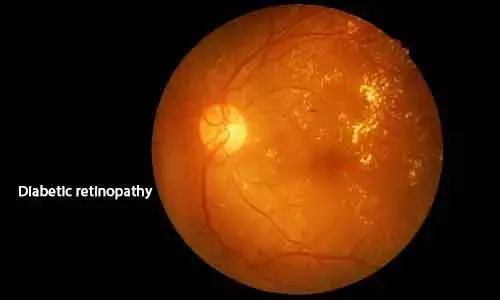- Home
- Medical news & Guidelines
- Anesthesiology
- Cardiology and CTVS
- Critical Care
- Dentistry
- Dermatology
- Diabetes and Endocrinology
- ENT
- Gastroenterology
- Medicine
- Nephrology
- Neurology
- Obstretics-Gynaecology
- Oncology
- Ophthalmology
- Orthopaedics
- Pediatrics-Neonatology
- Psychiatry
- Pulmonology
- Radiology
- Surgery
- Urology
- Laboratory Medicine
- Diet
- Nursing
- Paramedical
- Physiotherapy
- Health news
- Fact Check
- Bone Health Fact Check
- Brain Health Fact Check
- Cancer Related Fact Check
- Child Care Fact Check
- Dental and oral health fact check
- Diabetes and metabolic health fact check
- Diet and Nutrition Fact Check
- Eye and ENT Care Fact Check
- Fitness fact check
- Gut health fact check
- Heart health fact check
- Kidney health fact check
- Medical education fact check
- Men's health fact check
- Respiratory fact check
- Skin and hair care fact check
- Vaccine and Immunization fact check
- Women's health fact check
- AYUSH
- State News
- Andaman and Nicobar Islands
- Andhra Pradesh
- Arunachal Pradesh
- Assam
- Bihar
- Chandigarh
- Chattisgarh
- Dadra and Nagar Haveli
- Daman and Diu
- Delhi
- Goa
- Gujarat
- Haryana
- Himachal Pradesh
- Jammu & Kashmir
- Jharkhand
- Karnataka
- Kerala
- Ladakh
- Lakshadweep
- Madhya Pradesh
- Maharashtra
- Manipur
- Meghalaya
- Mizoram
- Nagaland
- Odisha
- Puducherry
- Punjab
- Rajasthan
- Sikkim
- Tamil Nadu
- Telangana
- Tripura
- Uttar Pradesh
- Uttrakhand
- West Bengal
- Medical Education
- Industry
Single dose of Vitamin A analog may improve diabetic retinopathy: Study

Researchers have found in a new study that visual function in diabetic mice was significantly improved after treatment with a single dose of a vitamin A analog. Visual chromophore 9-cis-retinal can form a visual pigment in the retina cells, thereby producing a light sensitive element of the retina.
This may go a long way to treat Diabetic retinopathy a common complication of diabetes and a leading cause of blindness among the working-age population.
The new study has been published in The American Journal of Pathology .
"In an earlier study we found that diabetes causes vitamin A deficiency in the retina, which results in deterioration of vision, even before any vascular changes can be seen. That finding led to the assumption that early changes in vision in diabetes are probably caused by vitamin A deficiency in the retina," explained lead investigator Gennadiy Moiseyev, PhD, Department of Physiology, University of Oklahoma Health Sciences Center, Oklahoma City, OK, USA.
In the current study investigators hypothesized that treating diabetic mice with 11-cis-retinal could rescue visual function. They investigated its effect in Akita mice, a genetic model of type 1 diabetes, by measuring electroretinogram (ERG) responses, retinal oxidative stress, and neuronal apoptosis (cell death). ERG was performed on two groups of three-month–old Akita mice and one group of non-diabetic control mice matched for age and genetic background. One group of Akita mice was treated with 9-cis-retinal and the other with a vehicle solution. Average blood glucose concentrations and body weights of the mice were measured monthly during the study. Akita mice showed high glucose concentrations throughout the study. ERG recordings and rhodopsin assay were performed two hours after 9-cis-retinal injection, whereas assessment of cell death by ELISA and TUNEL assay were both performed 24 hours after the injection.
Results showed that the visual function in diabetic mice improved significantly after treatment with the single dose of 9-cis-retinal. In addition, researchers reported that the treatment reduced oxidative stress in the retina, decreased retina cell death and retina degeneration, and improved visual function.
"This work supports our novel hypothesis that diabetes-induced disturbance of the vitamin A metabolism in the eye is responsible for reduced visual function in early stages of diabetic retinopathy," commented Dr. Moiseyev. "Currently, there is no available therapy to prevent the development of the retinal complication in patients suffering from diabetes. This study suggests that the delivery of visual chromophore to the diabetic eye may represent a potential therapeutic strategy for the early stages of diabetic retinopathy to prevent vision loss in patients with diabetes."
Traditionally, diabetic retinopathy was considered a disease caused by the pathology of blood vessels in the retina, whereby light-sensitive tissue at the back of the eye (fundus) becomes damaged. Patients with diabetes often experience functional deficits in dark adaptation, contrast sensitivity, and color perception before any microvascular pathologies are detected on the eye fundus. However, recent data underscore the importance of vitamin A for normal visual function. It serves as a precursor for light-sensitive 11-cis-retinal, the chromophore of visual pigments that can produce a light-sensitive protein in the retina.
For further reference log on to:
Dr Kamal Kant Kohli-MBBS, DTCD- a chest specialist with more than 30 years of practice and a flair for writing clinical articles, Dr Kamal Kant Kohli joined Medical Dialogues as a Chief Editor of Medical News. Besides writing articles, as an editor, he proofreads and verifies all the medical content published on Medical Dialogues including those coming from journals, studies,medical conferences,guidelines etc. Email: drkohli@medicaldialogues.in. Contact no. 011-43720751


